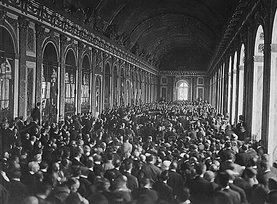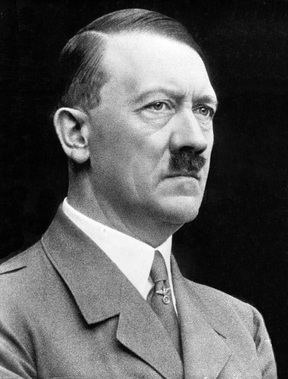CAUSES OF WORLD WAR II
World War II occurred just two decades after the end of World War I and was one of the most important events in all of world history. Although the war broke out in September of 1939 when Nazi Germany invaded Poland, the war had its beginnings in several key events, such as: the Treaty of Versailles, the failure of the League of Nations, the failed policy of appeasement and the rise to power of Adolf Hitler.
|
When World War I ended, Germany was forced to agree to the terms of the Treaty of Versailles. In general, the terms punished Germany and forced the country to give up land, limit its army and accept blame for starting World War I. The Treaty of Versailles created a legacy for Germany and Europe in the years after World War I. The treaty in now viewed by many as too severe of a punishment towards Germany in the years after World War I and is often viewed as a cause of World War II and the rise to power of Adolf Hitler and fascism in Germany. Hitler rose to power in Germany based on his refusal to continue to accept the terms of the treaty and his promise to return Germany's nationalistic pride.
|
The League of Nations was an international organization created following World War I with the goal of preventing another war from breaking out. It was hoped that the League of Nations would bring stability to global affairs by allowing disputes between countries to be settled through negotiation rather than conflict. If a dispute did occur, the League of Nations had three options to stop a conflict from occurring. First, the League of Nations could call on the states in dispute to sit down and discuss the problem in an orderly and peaceful manner. If this failed, the League of Nations could introduce economic sanctions against an aggressor nation in the hope that it would face bankruptcy if it did not follow the orders of the League of Nations. Finally, if the economic sanctions failed to work the League of Nations could potentially use their armies to fight. Unfortunately, the League of Nations failed to stop the growing crisis of Nazi aggression in the years before World War II. The organization lacked the ability to respond to aggression and was viewed as too weak against dictators such as Adolf Hitler and Benito Mussolini.
|
The policy of appeasement was the name for the foreign policy of the Western European countries of Britain and France towards Germany in the years after World War I but before World War II. This time is known as the interwar years and is the general timeframe when the Nazi Party and Adolf Hitler took control of Germany. After rising to power in Germany, Hitler began to carry out aggression towards other nation-states in Europe and Hitler carried out actions that went against the general terms of the Treaty of Versailles. The Western European democracies of Britain and France did not want to enter into a military conflict with Germany at this time as both had been reducing their armies and ability to wage war. This lack of will to fight pushed both countries towards the policy of appeasement which involved giving into the demands of an aggressive country in the hopes that the aggression could be contained. Some historians have argued that if the British and French had acted earlier than the German invasion of Poland, then they may have been able to stop Hitler and the Nazi’s and avoided the devastation of World War II. As such, many now look to the failure of appeasement as a reason to not use the same foreign policies in modern-day global conflicts.
|


